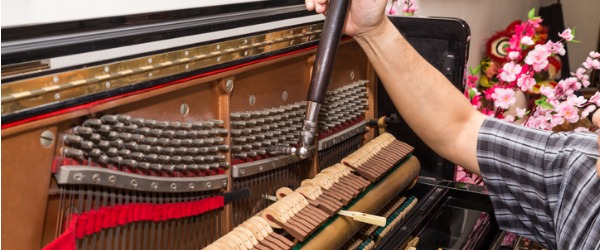What is a Piano Tuner?
A piano tuner is a skilled technician who is responsible for adjusting the tension of the strings inside a piano in order to ensure that the piano produces the correct pitch and has a balanced sound across all of its keys. Piano tuners use a variety of specialized tools, including a tuning hammer, mutes, and electronic tuning devices, to make precise adjustments to the pitch of each string in the piano.
In addition to tuning the piano, a piano tuner may also perform other maintenance tasks, such as cleaning the strings and hammers, repairing broken or worn parts, and regulating the touch and responsiveness of the keyboard. Piano tuners may work independently or as part of a team at a piano dealership, music store, or performance venue.
What does a Piano Tuner do?

A piano tuner is responsible for making sure that a piano produces the correct pitch and has a balanced sound across all of its keys. The job requires a high level of skill and attention to detail in order to ensure that the piano produces a beautiful and accurate sound. Here are some of the specific tasks that a piano tuner may perform:
- Tuning the piano: The primary responsibility of a piano tuner is to adjust the tension of the strings inside the piano so that each key produces the correct pitch. The tuner will use a tuning hammer to make tiny adjustments to the tension of each string until the piano is in tune.
- Testing the piano: After tuning the piano, the tuner will play each key and listen carefully to the sound to make sure that it is producing the correct pitch and has a balanced tone across all the keys.
- Making repairs: If the piano has broken or worn parts, such as a broken string or a damaged hammer, the tuner may perform repairs or replace these parts in order to ensure that the piano is functioning properly.
- Cleaning the piano: Piano tuners may also clean the strings, hammers, and other parts of the piano in order to remove dust and debris that can affect the sound and performance of the instrument.
- Regulating the touch and responsiveness of the keyboard: Piano tuners may also adjust the responsiveness of the keys and pedals in order to ensure that the piano is easy to play and responds accurately to the pianist's touch.
While it can be helpful for piano tuners to have some basic knowledge of piano playing, it is not a requirement to be a piano tuner. Piano tuners primarily need to have a good ear for pitch and be skilled in using tuning tools to adjust the pitch of the strings. They also need to have a solid understanding of piano construction and how the instrument works, as well as the ability to diagnose and repair common problems.
That being said, some piano tuners do have a background in music and may be able to provide additional services to clients, such as basic repairs or adjustments to the instrument's action or voicing. Additionally, understanding how the piano is played and how different types of music affect the instrument's sound can be helpful in providing tailored tuning services for musicians with specific needs or preferences.
What is the workplace of a Piano Tune like?
The workplace of a piano tuner can vary depending on their specific job and the type of pianos they work on. Here are some examples of different workplaces where a piano tuner may work:
- Concert halls and performance venues: Piano tuners who work for performance venues may be responsible for tuning and maintaining the pianos used for concerts, recitals, and other live events. This can involve working on a variety of different types of pianos, from grand pianos to upright pianos, and may require working on tight deadlines in order to prepare the piano for a performance.
- Piano dealerships and music stores: Piano tuners who work for dealerships and music stores may be responsible for tuning and preparing pianos that are for sale or rent. They may also perform repairs and other maintenance tasks on pianos that are being sold or rented out.
- Independent contractors: Some piano tuners work independently as contractors, and may travel to their clients' homes or workplaces in order to tune and maintain their pianos. This can involve a lot of travel, and may require working flexible hours in order to accommodate their clients' schedules.
- Educational institutions: Piano tuners may also work for educational institutions such as schools and universities, where they are responsible for tuning and maintaining the pianos used by students and faculty. This can involve working on a large number of pianos, and may require working during off-hours in order to avoid disrupting classes and other activities.
Frequently Asked Questions
Music Related Careers and Degrees
Careers
- A&R Administrator
- A&R Coordinator
- Booking Agent
- Choir Director
- Composer
- Conductor
- Digital Remastering Engineer
- Ethnomusicologist
- Jingle Writer
- Librettist
- Live Sound Engineer
- Lyricist
- Music Arranger
- Music Artist
- Music Business Manager
- Music Contractor
- Music Copyist
- Music Critic
- Music Editor
- Music Executive
- Music Historian
- Music Librarian
- Music Manager
- Music Producer
- Music Promoter
- Music Publicist
- Music Publisher
- Music Supervisor
- Music Teacher
- Music Therapist
- Music Studio Owner
- Musician
- Orchestrator
- Piano Accompanist
- Piano Tuner
- Recording Engineer
- Road Manager
- Session Musician
- Singer
Degrees
Piano Tuners are also known as:
Piano Technician